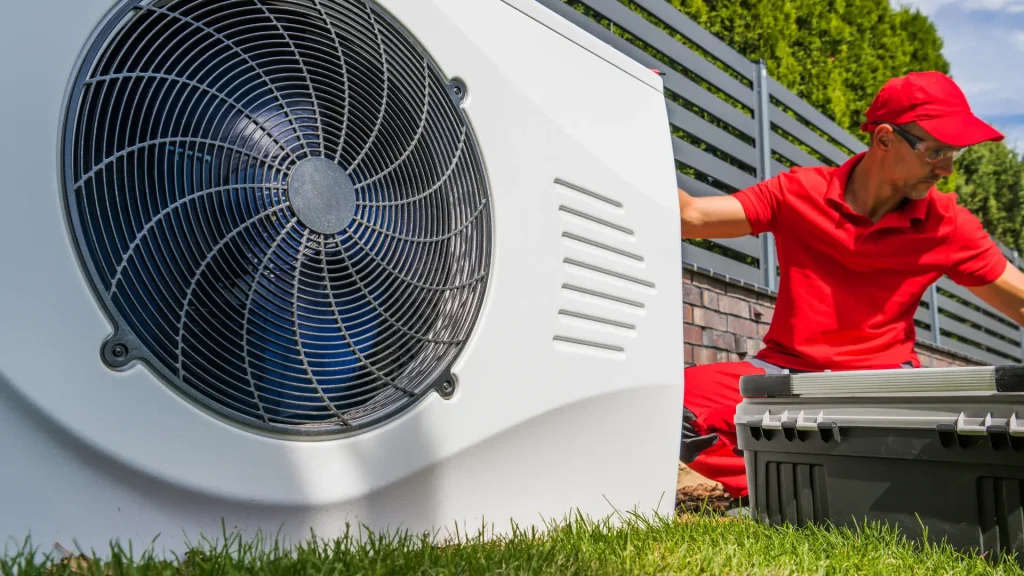YOUR SEARCH FOR THE
PERFECT
HEAT PUMP ENDS HERE
All we need, is for you to answer a few questions*
The UK's Most Loved Heat Pump Comparison Site
Heat pumps have become increasingly popular in the UK as a more energy-efficient alternative to traditional heating systems. With so many options available, it can be difficult to determine which heat pump is the best for your needs.







HOW DOES IT WORK?
01. Answer a few questions
Simply answer a few questions about your property/requirements. This wont take more than 45 seconds.
02. Take a deep breath
Based on your inputs. We will find the most cost effective heating solutions.
03. And done
In less than 30 seconds we will suggest the best suited electric heating service provider for you.

Why is it necessary to compare heat pumps?
For homes and businesses, heat pumps are a popular and cost-effective heating and cooling option. Instead of producing heat from a fuel source like a furnace or boiler, they operate by transporting heat between the interior and outdoor environments. They can therefore be significantly more effective than conventional heating and cooling systems, which is why many people are thinking about installing them in their homes or places of work.
Yet not every heat pump is made equally. Heat pumps come in a wide variety of types and models, each with advantages and disadvantages of their own. For this reason, it’s important to evaluate heat pumps before making a choice.
Here are some reasons why it’s important to compare heat pumps:
EFFICIENCY
The energy efficiency of heat pumps is one of their main benefits. Yet not every heat pump is equally effective. You can determine which models are the most effective and will reduce your energy costs the most by comparing them.
FEATURES
Many features, including zone control, variable-speed compressors, and programmable thermostats, are included with heat pumps. You can determine which qualities are most significant to you and locate a heat pump that fits your requirements by contrasting several models.
COST
As heat pumps can be expensive, it’s crucial to compare models to locate one that is within your price range. You can determine which heat pump delivers the best value for your money by comparing the prices of several models.
QUALITY
Not every heat pump is created equal. You can tell which models are long-lasting and will deliver dependable heating and cooling for many years by contrasting various types.
ENVIRONMENTAL IMPACT
Some heat pump models are more eco-friendly than others, but overall they are a more environmentally friendly heating and cooling choice than conventional systems. You can determine which model is best for your house or place of business by contrasting various options.
NOISE LEVEL
For homeowners or business owners who value quiet environments, certain heat pumps can be rather noisy. You may determine which models are the quietest and best suited to your needs by contrasting several types.
COMPATIBILITY
You should make sure that your new heat pump is compatible with your old system if you already have a heating or cooling system installed in your residence or place of business. You can discover a model that works with your present set up by evaluating several options.
MAINTENANCE
The correct operation of heat pumps depends on routine maintenance, much like any other mechanical equipment. You can determine which models need the least upkeep and are the simplest to maintain over time by comparing several models. Long-term, this might save you time and money on maintenance expenses.
CLIMATE
In different climates, heat pumps function differently, and certain models can be better suited to a given environment than others. Finding a model that is best suited for the environment in your location through comparison can increase performance and efficiency.
BRAND REPUTATION
When comparing heat pumps, it can be crucial to take into account the reputation of the manufacturer and the calibre of the customer service. You can pick a heat pump from a respected manufacturer that gives good customer service by investigating the reputation of various companies and their customer care policies. This may give you peace of mind and lower the likelihood of experiencing troubles or issues in the future.
Who should compare heat pumps?
Anyone who is thinking about using a heat pump for their house or place of business should compare heat pumps. Homeowners, company owners, property managers, contractors, and HVAC specialists all fall under this category.
To make sure you select the greatest solution for your unique needs, budget, and climate, you must compare heat pumps. You can choose the heat pump that is the most economical, trustworthy, dependable, and environmentally friendly solution for your house or company by completing your homework and comparing several models.
You can speak with a qualified HVAC contractor or installer who can offer advice and recommendations based on your unique needs and budget if you’re unsure of what to take into account when comparing heat pumps.

What are the benefits of using a Heat Pump?
Maintaining your home’s warmth becomes a primary issue when winter approaches and the temperature drops. Heat pumps are becoming popular among homeowners as an affordable and energy-efficient replacement for conventional heating systems.
We’ll dig a bit deeper into the advantages of using a heat pump:
Lower Energy Bills
The potential for energy bill reductions is one of the most important benefits of employing a heat pump, as was already noted. This is because heat pumps are far more efficient than conventional heating systems that rely on fossil fuels because they utilise renewable energy sources. Also, because heat pumps don’t produce heat by burning fuel, they don’t emit dangerous chemicals like carbon monoxide.
Your home’s size, the kind of heat pump you install, and the effectiveness of your current heating system will all affect the precise amount of savings you may anticipate. Yet, according to estimates from the Energy Saving Trust, a properly built and utilised air source heat pump may reduce annual energy costs for a typical UK home by between £400 and £1,400 when compared to oil heating and between £300 and £1,200 when compared to gas heating.
Environmentally Friendly
An eco-friendly replacement for conventional heating systems is a heat pump. They lessen the energy needed to heat your home by drawing heat from the air or ground outside, which also lowers your carbon footprint. Homeowners may cut their carbon footprint by up to 70% by switching from a gas boiler to an air source heat pump, according to the Carbon Trust.
Versatility
Heat pumps are a flexible alternative for UK homeowners because they can supply both heating and cooling. Heat pumps can be switched around to cool your house in the summer, keeping you comfortable all year round. This is accomplished by using a technique known as “reverse cycle,” in which the heat pump merely removes heat from your house and releases it outside.
Longer Lifespan
Heat pumps are a flexible alternative for UK homeowners because they can supply both heating and cooling. Heat pumps can be switched around to cool your house in the summer, keeping you comfortable all year round. This is accomplished by using a technique known as “reverse cycle,” in which the heat pump merely removes heat from your house and releases it outside.
Government Grants & Incentives
In order to encourage householders to switch to more energy-efficient heating systems, the UK government has launched a number of programmes. Homeowners that install renewable heating systems, such as air source heat pumps, are given financial assistance under the Household Renewable Heat Incentive (RHI).
Based on how much renewable heat their system generates, homeowners can participate in the programme and earn quarterly payments for up to 7 years. Heat pumps can become a more cost-effective choice as a result of helping to offset the early installation costs.
The UK government has also launched the Green Homes Grant, which offers financial assistance to homeowners for energy-saving home upgrades like heat pumps. In accordance with this programme, homeowners are eligible to receive vouchers up to £5,000 that can pay for up to two-thirds of the cost of qualifying house modifications.
What are the different types of heat pumps?

Air Source Heat Pumps
This kind of heat pump transmits heat from the outside air to your house. These are typically the least expensive and most straightforward heat pump to install.
Ground Source Heat Pumps
These heat pumps use a network of pipes that are installed in your yard to harvest heat from the ground. Although they can be more effective in colder climates, they are more expensive to install than air source heat pumps.


Water Source Heat Pumps
This kind of heat pump draws heat from a lake or river or other nearby body of water. They need access to a proper water source, but are often more efficient than air source heat pumps.
Exhaust Source Heat Pumps
These heat pumps are a wonderful alternative for homes with mechanical ventilation systems since they capture heat from the air that is being vented out of your house.


Hybrid Heat Pumps
The advantages of a heat pump are combined with those of a conventional heating system, like a gas boiler or electric heater, in these heat pumps. This makes them a more versatile alternative by enabling the system to switch between several heat sources based on the outside temperature and energy prices.
The size of your home, your heating requirements, and the climate in your location should all be taken into account when selecting a heat pump. A certified installer can guide you in selecting the best heat pump for your residence and make sure that it is set up and maintained correctly.
Frequently Asked Questions
A heat pump is a heating and cooling system that transfers heat from one area to another using refrigerant. In the winter, the heat pump extracts heat from the outside air or ground and transfers it indoors to heat the home. In the summer, the process is reversed to cool the home.
A heat pump works by using a refrigerant to absorb heat from one area and release it in another. In heating mode, the refrigerant absorbs heat from the outside air or ground and transfers it indoors, where it is released to heat the home. In cooling mode, the process is reversed to absorb heat from inside the home and release it outdoors to cool the home.
Some advantages of using a heat pump include improved energy efficiency, lower operating costs, and reduced environmental impact compared to traditional heating and cooling systems. Heat pumps can also provide both heating and cooling, making them a versatile option for year-round comfort.
There are several types of heat pumps, including air-source heat pumps, ground-source (geothermal) heat pumps, and water-source heat pumps. Air-source heat pumps are the most common type and extract heat from the outdoor air. Ground-source and water-source heat pumps extract heat from the ground or a water source.
Yes, heat pumps are generally more energy-efficient than traditional heating and cooling systems, as they transfer heat rather than generate it. However, the energy efficiency of a heat pump can depend on factors such as the climate, size and type of the unit, and the insulation and efficiency of the home.
Yes, heat pumps can work in cold weather, although their efficiency may decrease in extreme temperatures. Some models may be designed to operate in colder climates or may have backup heating systems to supplement heating during very cold weather.
The cost of installing a heat pump in the UK can vary depending on factors such as the size and type of the unit, the complexity of the installation, and the location of the property.
Heat pumps are typically quieter than traditional heating and cooling systems, as they do not rely on combustion or mechanical parts that can generate noise. However, some models may produce a low humming or buzzing sound when in operation, which may be noticeable in quiet environments.
Yes, there are several government grants and incentives available in the UK for installing heat pumps. The Renewable Heat Incentive (RHI) is a government-funded scheme that provides financial support for renewable heating systems, including heat pumps. There may also be local or regional grants available, as well as tax credits and rebates for energy-efficient home improvements. It’s recommended to consult with a qualified installer or energy advisor to explore available options
While it is possible to install a heat pump yourself, it is highly recommended that you hire a professional HVAC contractor to ensure that the installation is done correctly and safely.
You can improve the efficiency of your heat pump by ensuring that it is properly sized for your home, regularly cleaning or replacing air filters, sealing air leaks in your home, and keeping the area around the outdoor unit clear of debris.
Choosing the right size heat pump for your home requires a calculation based on factors such as the size of your home, climate, and insulation. A professional HVAC contractor can perform this calculation and recommend the appropriate size heat pump for your needs.
Yes, most heat pumps are designed to provide both heating and cooling for a home. This makes them a versatile and efficient option for year-round comfort.
The amount of money you can save on energy costs with a heat pump will depend on factors such as the efficiency of the unit, the size of your home, and the climate in your area. On average, homeowners can expect to save between 20-50% on heating and cooling costs compared to traditional systems.
Yes it is possible.
This is a crucial decision because it could substantially increase your expenses and degrade performance. Building insulation and orientation should be taken into account when determining the ideal device size in order to account for potential heat dispersion. While it is more difficult for the heat pump to extract heat and function at lower temperatures, you should also take into account the size of the area you need to heat and the wintertime average temperature.
Yes. The system functions because of the heat exchange. Via an outside heat exchanger coil and an indoor heat exchanger coil, the heat pump transmits heat from the outside into the system ductwork.
This indicates that the heat pump is in the defrost cycle, therefore there is no need to be concerned. As the temperature rises and the ice melts more easily, the exterior fan turns off, and the heat pump enters the air conditioning mode, operating as a condenser.
Many people think that operating a heat pump continuously is an excellent, economical way to heat their home. But, that notion is a misconception in actuality. It is far better to simply operate your heat pump when you are at home because doing that really results in more energy being used and lost overall. You’ll also spend less on your electricity bill if you do that.
Compareheatpumps.io is an independent comparison and review site for electric heaters and electric radiators. The views expressed on this website are the opinions of our writers and editors. Please note that we may receive advertising revenue from some or all of the suppliers and manufacturers listed on this website.
The UK’s most loved heat pumps comparison site
SWITCH TO A HEAT PUMP TODAY!
© 2023 | CompareHeatPumps.io | All rights reserved
